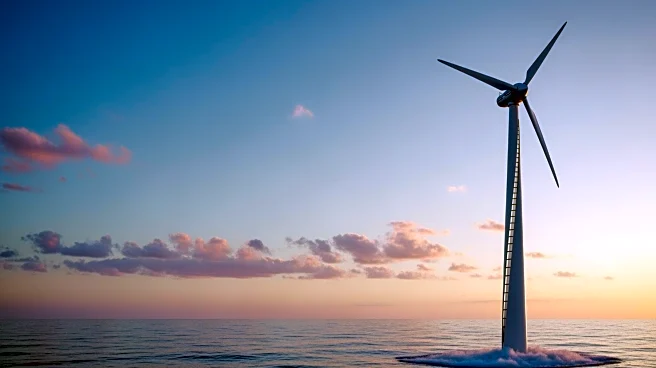What's Happening?
Dominion Energy is progressing with its Coastal Virginia Offshore Wind project, which is set to become the largest offshore wind farm in the United States. The project, a joint venture with Stonepeak, is currently 66% complete and is expected to deliver
its first electricity to customers by early 2026, with full completion anticipated by the end of 2026. However, the installation of the final turbine towers may extend into early 2027 due to delays in commissioning the Charybdis turbine installation vessel. The total project cost is estimated at $11.2 billion, with U.S. tariffs expected to increase costs by $690 million through 2026. Dominion's CEO, Robert Blue, expressed confidence in the project's bipartisan support, emphasizing its importance for infrastructure upgrades and energy supply to technology and defense sectors.
Why It's Important?
The Coastal Virginia Offshore Wind project is significant as it represents a major step in the U.S. transition to renewable energy sources. The project is expected to provide 2.6 GW of power, supporting the growing energy demands of data centers and technology companies. It also aligns with broader efforts to reduce carbon emissions and enhance energy security. The project's completion will contribute to the U.S. renewable energy capacity, potentially influencing energy prices and policy decisions. However, the increased costs due to tariffs highlight the financial challenges associated with large-scale renewable projects, impacting both Dominion and its partner, Stonepeak.
What's Next?
Dominion Energy plans to continue its 'all of the above' resource strategy, which includes a mix of transmission, thermal, and renewable power projects. The company is also pursuing regulatory approvals for additional projects, such as the Chesterfield Energy Reliability Center and various solar and energy storage initiatives. The outcome of these regulatory processes will shape Dominion's future energy portfolio. Additionally, Dominion's ongoing collaboration with Amazon to explore small modular reactors indicates a cautious approach to nuclear energy, balancing innovation with fiscal responsibility.
Beyond the Headlines
The development of the Coastal Virginia Offshore Wind project underscores the complex interplay between energy policy, economic factors, and technological advancements. The project's reliance on bipartisan support highlights the political dimensions of energy infrastructure development. Furthermore, the financial implications of tariffs and cost overruns reflect broader economic challenges in the renewable energy sector. As Dominion navigates these issues, the project serves as a case study in the transition to sustainable energy, with potential lessons for other utilities and policymakers.

















